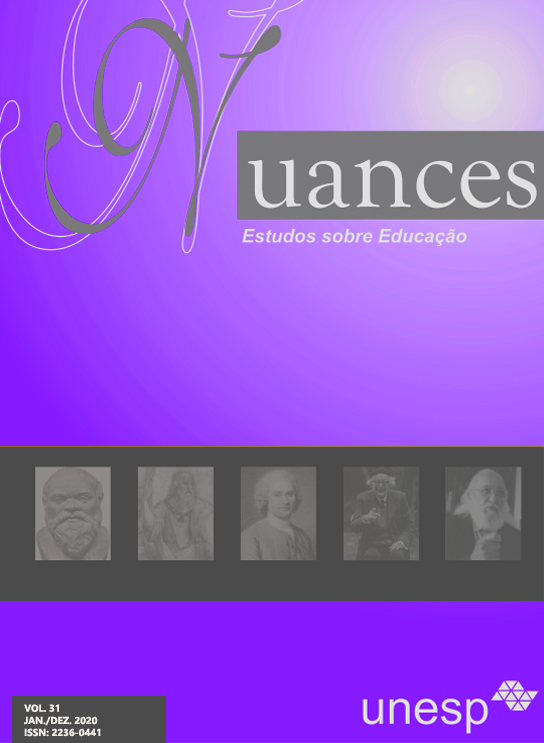Exploring the educational potential of Instagram in professional development
Strategies and perspectives
DOI:
https://doi.org/10.32930/nuances.v31i0.10322Keywords:
Instagram, Educational Possibilities, Knowledge, Professional Development, Culture of ConvergenceAbstract
Information and Communication Technologies (ICTs) have fundamentally transformed social, educational, and professional interactions. With the proliferation of mobile devices, the internet, and social networks, the way people communicate, learn, and work has been redefined. In this context, this study focuses on the educational potential of Instagram in professional development. Although initially conceived as a platform for sharing photos and videos, Instagram has emerged as a rich environment for knowledge exchange and building professional networks. Therefore, the aim of this study is to analyze the educational potential of Instagram and present practical strategies for its effective use in professional development. The methodology adopted consisted of an approach grounded in two pillars: theoretical foundation, mainly based on Jenkins (2008), and analysis of the formats and characteristics offered by the platform, interpreted in light of the convergence culture. The results point to Instagram as a potential ally in the learning and professional development process. Despite the limitations regarding possible changes in the platform, this study aims to contribute to the literature on the educational use of social networks, specifically focused on Instagram.
Downloads
References
BEMBEM, A. H. C.; COSTA, P. L. V. A. da. Inteligência coletiva: um olhar sobre a produção de Pierre Lévy. Perspectivas em Ciência da Informação, v. 18, n. 4, p. 139-151, 2013. DOI: 10.1590/S1413-99362013000400010.
BIZELLI, J. L. et al. Uso assertivo de narrativas transmídia e de Tecnologias da Informação e da Comunicação como ferramentas para fomento da aprendizagem. Revista Eletrônica Pesquiseduca, Santos, v. 13, p. 223-235, 2021. DOI: 10.58422/repesq.2021.e1099.
CASTELLS, M. A sociedade em rede. [S. l.]: Paz e Terra, 1999
FONSECA, J. J. S. Metodologia da pesquisa científica. Fortaleza: UEC, 2002. Apostila.
GERALDI, L. M. A.; BIZELLI, J. L. Tecnologias da informação e comunicação na educação: conceitos e definições. Revista on line de Política e Gestão Educacional, Araraquara, v. 18, 2017. DOI: DOI: 10.22633/rpge.v0i18.9379.
Jenkins, H. Cultura da Convergência. [S. l.]: Ed. Aleph, 2008.
LAGO, N. C.; TERRA, S. X.; TEM-CATEN, C. S.; RIBEIRO, J. L. D. Ensino remoto emergencial: investigação dos fatores de aprendizado na educação superior. Revista Ibero-Americana de Estudos em Educação, v. 16, n. 2, p. 391-406, 2021. DOI: 10.21723/riaee.v16i2.14439.
LEMOS, A. Cibercultura, tecnologia e vida social na cultura contemporânea. [S. l.]: Sulina, 2004.
LEMOS, A.; LÉVY, P. O futuro da internet: na direção a uma ciberdemocracia. São Paulo: Paulus, 2010.
LÉVY, P. A inteligência coletiva: por uma antropologia do ciberespaço. 4. ed. [S. l.]: Loyola, 2003.
LIPOVETSKY, G. Tempos hipermodernos. [S. l.]: Barcarolla, 2004.
MLABS. Redes sociais mais usadas. 2020. Disponível em: https://www.mlabs.com.br/blog/redes-sociais-mais-usadas. Acesso em: 10 jan. 2020.
SODRÉ, M. Antropológica do Espelho: uma teoria da comunicação linear e em rede. Pretrópolis, RJ: Vozes, 2002.
Downloads
Published
How to Cite
Issue
Section
License
Copyright (c) 2020 Nuances: estudos sobre Educação

This work is licensed under a Creative Commons Attribution-NonCommercial 4.0 International License.
Atribuição-NãoComercial
CC BY-NC
Esta licença permite que outros remixem, adaptem e criem a partir do seu trabalho para fins não comerciais, e embora os novos trabalhos tenham de lhe atribuir o devido crédito e não possam ser usados para fins comerciais, os usuários não têm de licenciar esses trabalhos derivados sob os mesmos termos.





